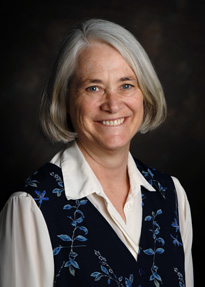Charity Scott recognized with Heroes in Health Care Ethics Award
ATLANTA—Georgia State University College of Law Professor Charity Scott, who directs the Center for Law, Health & Society, recently was recognized by the Health Care Ethics Consortium of Georgia with its Heroes in Health Care Award.
 Scott received the award "in recognition of her dedication to ethics in health care through her tireless commitment to education, policy, and practice at the intersection of law and bioethics through the Center for Law, Health & Society at Georgia State University and in the broader community."
Scott received the award "in recognition of her dedication to ethics in health care through her tireless commitment to education, policy, and practice at the intersection of law and bioethics through the Center for Law, Health & Society at Georgia State University and in the broader community."
College of Law Dean Steven J. Kaminshine said it's hard to imagine a more worthy honoree of an award recognizing innovative work in the area of health care ethics. He also noted that Scott, as a lawyer and a legal educator, is not the typical honoree for an award presented by a group largely made up of health care organizations and providers.
"Lawyers and health care professionals are often seen as antagonists, as not being aligned in serving the interests of patients," Kaminshine explained. "But that's what makes Charity's selection for this award so fitting. Her very selection ratifies and honors a professional life dedicated to bridging the divide between the health care and legal communities and uniting these professions around the cause of health care ethics."
Scott earned her J.D. from Harvard Law School in 1979 (cum laude), and her B.A. with honors from Stanford University in 1973 (Phi Beta Kappa). She recently earned her Master of Science in Conflict Management (MSCM) degree from Kennesaw State University.
"This award is really a tribute to the wonderfully dynamic health care and bioethics community in Georgia and their collaborative efforts with lawyers to 'do the right thing' for patients and families who are facing difficult choices," said Scott.
Scott joined the Georgia State Law faculty in 1987. Six years ago, she established the Center for Law, Health & Society, which has built partnerships with many government, academic and business institutions across Atlanta. The center oversees the College of Law's health law program, recently ranked by U.S. News & World Report as the No. 4 program in health law in the country.
Through interdisciplinary research, education, and community outreach, the center prepares future leaders in the legal and health professions to address society's many health challenges in the 21st century. The center also supports collaboration among multi-disciplinary faculty and practitioners whose research and professional work can help to improve health and the health care system.
An illustration of such collaboration is the educational and community outreach project known as the Health Law Partnership (HeLP), an interdisciplinary partnership among the center, the Atlanta Legal Aid Society, and Children's Healthcare of Atlanta to improve the health of low-income children and their families in metropolitan Atlanta through on-site legal services clinics at Children's hospitals. By combining the health care expertise of hospital professionals with the legal expertise of attorneys, HeLP can provide a coordinated and integrated set of services to address the multiple determinants of low-income children's health. The HeLP Legal Services Clinic at the law school is a key component of HeLP and extends its interdisciplinary educational mission to law students and graduate students in the health field.
Kathy Kinlaw, executive director of the Health Care Ethics Consortium of Georgia, recalled when Scott came to her many years ago to inquire about doing a six-month fellowship at Grady Memorial Hospital so she could spend time learning on the wards. Kinlaw, who also serves as associate director of the Emory University Center for Ethics and director of the center's program in Health Sciences and Ethics, remembers Scott coming to her at some point during that fellowship to report that she had been told by one of the hospital leaders that there were no ethical issues in his department.
"Which, of course, we knew was not the case," Kinlaw said. "Charity continues to be a very important part of our clinical ethics program at the School of Medicine, helping with the teaching of ethics, and also at the intersection of law, health and ethics, she has been such a powerful figure for the Atlanta area as well as all of us in the university environment."
Dr. Robert Pettignano, chief at Emory Pediatric Critical Care, first collaborated with Scott several years ago when they taught medical ethics to medical students and law students.
"I think Charity set a model for interdisciplinary education," he said. "She's able to incorporate and yet separate ethics and law in medicine. In addition to that, our collaboration exists with the Health Law Partnership, where she provides energy and direction in addressing the health care disparities that exist within our health care system."
Sylvia Caley, assistant clinical professor and co-associate director of the HeLP Clinic, said collaboration is part of Scott's fiber. She has a unique ability to build bridges, unify players and sometimes bring some unlikely partners together.
"I think Charity's commitment to collaboration in ethics is to improve outcomes for people who need services and also to assist health providers and professionals at the bedside with ethical issues," Caley said. "I know that Charity has made things happen that the faint of heart might think impossible."
View video tribute to Charity Scott
Contact:
Wendy Cromwell
Director of Communications
wcromwell@gsu.edu